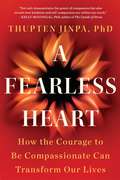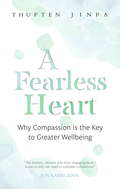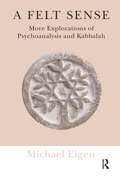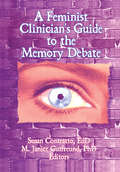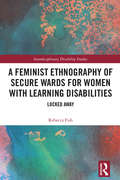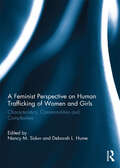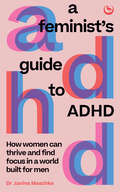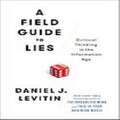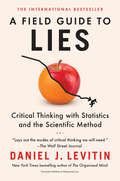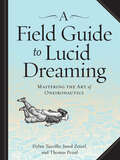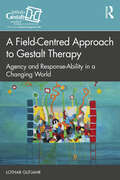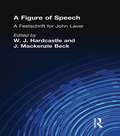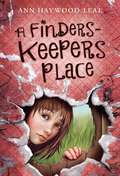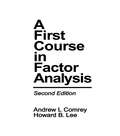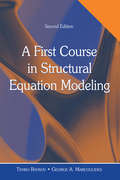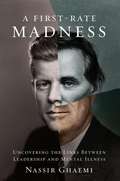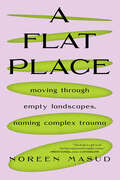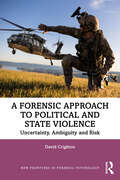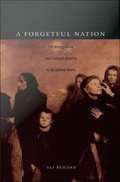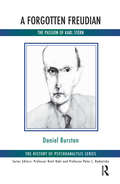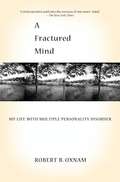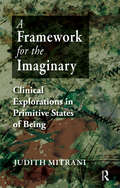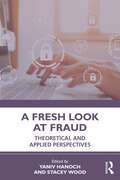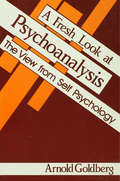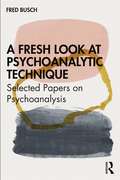- Table View
- List View
A Fearless Heart
by Thupten JinpaThe Buddhist practice of mindfulness caught on in the west when we began to understand the everyday, personal benefits it brought us. Now, in this extraordinary book, the highly acclaimed thought leader and longtime English translator of His Holiness the Dalai Lama shows us that compassion can bring us even more. Based on the landmark course in compassion training Jinpa helped create at Stanford Medical School, A Fearless Heart shows us that we actually fear compassion. We worry that if we are too compassionate with others we will be taken advantage of, and if we are too compassionate with ourselves we will turn into slackers. Using science, insights from both classical Buddhist and western psychology, and stories both from others and from his own extraordinary life, Jinpa shows us how to train our compassion muscle to relieve stress, fight depression, improve our health, achieve our goals, and change our world. Practical, spiritual, and immediately relevant, A Fearless Heart will speak to readers of The Art of Happiness and Wherever You Go, There You Are.
A Fearless Heart: Why Compassion is the Key to Greater Wellbeing
by Thupten Jinpa'[A] timely book on compassion and its cultivation' The Dalai Lama'The bravest, cleverest and most engaging book I know on why we need to cultivate compassion' Jon Kabat-Zinn'A practical toolkit for becoming a better human being' Daniel Goleman Self-compassion is the overlooked key to achieving our goals. It can lead to increased happiness, stress reduction, a stronger sense of purpose, better health and a longer life. Yet many of us resist compassion, worrying that if we are too compassionate with others we will be taken advantage of and if we are too compassionate with ourselves we won't achieve our goals in life. Using the latest science, psychology (from contemporary Western and classical Buddhist sources) as well as stories from others and his own extraordinary life, Jinpa shows us how to train our compassion muscle. His powerful programme, derived from his remarkable course in Compassion Cultivation Training (CCT), is the perfect guide to achieving a greater sense of wellbeing.
A Felt Sense: More Explorations of Psychoanalysis and Kabbalah
by Michael EigenThis book explores the intertwining of myth, dream, and everyday reality, which mark the prose and poetry of both. It focuses on psychic reality, with psychoanalysis and Kabbalah tools in this great enterprise of learning to work with ourselves.
A Feminist Clinician's Guide to the Memory Debate (Women And Therapy Ser. #Vol. 19, No. 1)
by Susan Contratto M. Janice GutfreundFirst published in 1997. Routledge is an imprint of Taylor & Francis, an informa company.
A Feminist Ethnography of Secure Wards for Women with Learning Disabilities: Locked Away (Interdisciplinary Disability Studies)
by Rebecca FishWhat is life like for women with learning disabilities detained in a secure unit? This book presents a unique ethnographic study conducted in a contemporary institution in England. Rebecca Fish takes an interdisciplinary approach, drawing on both the social model of disability and intersectional feminist methodology, to explore the reasons why the women were placed in the unit, as well their experiences of day-to-day life as played out through relationships with staff and other residents. She raises important questions about the purpose of such units and the services they offer. Through making the women’s voices heard, this book presents their experiences and unique perspectives on topics such as seclusion, restraint, and resistance. Exploring how the ever present power disparity works to regulate women’s behaviour, the book shows how institutional responses replicate women’s bad experiences from the past, and how women’s responses are seen as pathological. It demonstrates that women are not passive recipients of care, but shape their own identity and futures, sometimes by resisting the norms expected of them (within allowed limits) and sometimes by transgressing the rules. These insights thus challenge traditional institutional accounts of gender, learning disability and deviance and highlight areas for reform in policy, practice, methodology, and social theory. This ground-breaking book will be of interest to scholars, students, policymakers and advocates working in the fields of learning disability and disability studies more widely, gender studies and sociology.
A Feminist Perspective on Human Trafficking of Women and Girls: Characteristics, Commonalities and Complexities
by Nancy M. Sidun and Deborah L. HumeFocusing on the trafficking of women and girls from a feminist perspective, this book examines how social structures and gender influence human trafficking. While women and girls are not the only victims of trafficking, they tend to be disproportionally represented. Structural inequities – including poverty, gender-based violence, racism, class and caste-based discrimination and other forms of oppression and marginalization – place some individuals at substantially greater risk to be trafficked. The contributors explore topics including trauma-informed assessment of, and therapy with, survivors of human trafficking; issues facing children of trafficked women when they are reintegrated into their communities post-trafficking; the intersection of trafficking with racial and cultural oppression; critical aspects of international sex trafficking; and commercial sexual exploitation of children. The book concludes with a discussion of how human trafficking intersects with both intracountry adoption and brokered marriages. This book was originally published as a special issue of Women & Therapy.
A Feminist's Guide to ADHD: How women can thrive and find focus in a world built for men
by Janina MaschkeAn empowering, feminist guide to understanding and managing ADHD for women, written by a popular millennial doctor with ADHD.ADHD affects women in unique ways. Discover how to deal with it – and how to thrive – in this empowering guide.Whether you have received a late diagnosis, a misdiagnosis – or even no diagnosis at all but think this might apply to you – experienced coach Dr Janina Maschke offers guidance and support to all women and girls impacted by ADHD. As well as featuring the latest research, personal case-studies and practical exercises, this book gives you tips on thriving with ADHD and embracing neurodiversity.You will learn:the role of gender in understanding ADHDthe challenges of diagnosing womenthe differences between the subtypesthe role of hormones in treating symptomscommon co-existing conditionstools for thriving with ADHD.Whether you&’re seeking information pre-diagnosis or looking to manage your symptoms, this is a must-read for all women impacted by ADHD.
A Field Guide to Lies: Critical Thinking in the Information Age
by Daniel J. LevitinFrom The New York Times bestselling author of THE ORGANIZED MIND and THIS IS YOUR BRAIN ON MUSIC, a primer to the critical thinking that is more necessary now than ever. We are bombarded with more information each day than our brains can process--especially in election season. It's raining bad data, half-truths, and even outright lies. New York Times bestselling author Daniel J. Levitin shows how to recognize misleading announcements, statistics, graphs, and written reports revealing the ways lying weasels can use them. It's becoming harder to separate the wheat from the digital chaff. How do we distinguish misinformation, pseudo-facts, distortions, and outright lies from reliable information? Levitin groups his field guide into two categories--statistical infomation and faulty arguments--ultimately showing how science is the bedrock of critical thinking. Infoliteracy means understanding that there are hierarchies of source quality and bias that variously distort our information feeds via every media channel, including social media. We may expect newspapers, bloggers, the government, and Wikipedia to be factually and logically correct, but they so often aren't. We need to think critically about the words and numbers we encounter if we want to be successful at work, at play, and in making the most of our lives. This means checking the plausibility and reasoning--not passively accepting information, repeating it, and making decisions based on it. Readers learn to avoid the extremes of passive gullibility and cynical rejection. Levitin's charming, entertaining, accessible guide can help anyone wake up to a whole lot of things that aren't so. And catch some lying weasels in their tracks!
A Field Guide to Lies: Critical Thinking with Statistics and the Scientific Method
by Daniel J. LevitinWinner of the National Business Book AwardFrom the New York Times bestselling author of The Organized Mind and This Is Your Brain on Music, a primer to the critical thinking that is more necessary now than ever We are bombarded with more information each day than our brains can process—especially in election season. It's raining bad data, half-truths, and even outright lies. New York Times bestselling author Daniel J. Levitin shows how to recognize misleading announcements, statistics, graphs, and written reports, revealing the ways lying weasels can use them. It's becoming harder to separate the wheat from the digital chaff. How do we distinguish misinformation, pseudo-facts, and distortions from reliable information? Levitin groups his field guide into two categories—statistical information and faulty arguments—ultimately showing how science is the bedrock of critical thinking. Infoliteracy means understanding that there are hierarchies of source quality and bias that variously distort our information feeds via every media channel, including social media. We may expect newspapers, bloggers, the government, and Wikipedia to be factually and logically correct, but they so often aren't. We need to think critically about the words and numbers we encounter if we want to be successful at work, at play, and in making the most of our lives. This means checking the plausibility and reasoning—not passively accepting information, repeating it, and making decisions based on it. Readers learn to avoid the extremes of passive gullibility and cynical rejection. Levitin's charming, entertaining, accessible guide can help anyone wake up to a whole lot of things that aren't so. And catch some weasels in their tracks!
A Field Guide to Lucid Dreaming: Mastering the Art of Oneironautics
by Dylan Tuccillo Jared Zeizel Thomas PeiselImagine being able to fly. Walk through walls. Shape-shift. Breathe underwater. Conjure loved ones—or total strangers—out of thin air. Imagine experiencing your nighttime dreams with the same awareness you possess right now—fully functioning memory, imagination, and self-awareness. Imagine being able to use this power to be more creative, solve problems, and discover a deep sense of well-being.This is lucid dreaming—the ability to know you are dreaming while you are in a dream, and then consciously explore and change the elements of the dream. A Field Guide to Lucid Dreaming, with its evocative retro illustrations, shows exactly how to do it. Written by three avid, experienced lucid dreamers, this manual for the dream world takes the reader from step one—learning how to reconnect with his or her dreams— through the myriad possibilities of what can happen once the dreamer is lucid and an accomplished oneironaut (a word that comes from the Greek oneira, meaning dreams, and nautis, meaning sailor).Readers will learn about the powerful REM sleep stage—a window into lucid dreams. Improve dream recall by keeping a journal. The importance of reality checks, such as “The Finger”—during the day, try to pass your finger through your palm; then, when you actually do it successfully, you’ll know that you’re dreaming. And once you become lucid, how to make the most of it. Every time you dream, you are washing up on the shores of your own inner landscape. Learn to explore a strange and thrilling world with A Field Guide to Lucid Dreaming.
A Field-Centred Approach to Gestalt Therapy: Agency and Response-ability in a Changing World (The Gestalt Therapy Book Series)
by Lothar GutjahrIn Gestalt therapy, sociological, political, and economic research is often neglected or ignored. Drawing on analyses about current societal conditions, this book considers that there is no such thing as a ‘postmodern’ therapy and offers a new approach to Gestalt therapy.Gestalt therapy is still currently based on the Cartesian worldview, even if relational approaches are in search for an ‘in-between’. The author’s approach of Gestalt therapy is based on an idea by the founders: “Contact is the first reality” – so the field coemerges and coexists with individuals’ perceptions providing specific conditions, demands, limitations and opportunities. An individual’s field is not an afterthought established by the perspective of the first-person-singular (i.e. individuals) but a ‘conditio sine qua non’. Gutjahr reflects on both theoretical and practical aspects of the field’s many processes of resonance. Putting the field consistently at the centre of his approach, the author describes the main tenets expanding on previous versions of Gestalt therapy.This important new book is at the cutting edge of the current discussion of relational and field-oriented approaches to Gestalt therapy, and will be of particular interest to practitioners of Gestalt therapy, psychotherapists, phenomenologists, as well as theorists of philosophy, sociology and therapy.
A Figure of Speech: A Festschrift for John Laver
by W. J. Hardcastle J. Mackenzie BeckThroughout the world, there are phoneticians who have been influenced by the teaching, research, and writings of John Laver. Many have worked with him personally, and most of the contributors to this book are people with whom he has had special links or whose involvement represents an appreciation of the breadth of Laver's interests. While the book is meant to be a tribute to John Laver, the topics have been chosen to provide an overview of some key issues in phonetics, with illuminating contributions from some of the most influential academics in the field. Contributing to this festschrift are William Hardcastle, Janet Mackenzie Beck, Peter Ladefoged, John J. Ohala, F. Gibbon, Anne Cutler, Mirjam Broersma, Helen Fraser, Peter F. MacNeilage, Barbara L. Davis, R. E. Asher, E. L. Keane, G. J. Docherty, P. Foulkes, Janet Fletcher, Catherine Watson, John Local, Ailbhe Ní Chasaide, Christer Gobl, John H. Esling, Jimmy G. Harris, and Francis Nolan.
A Finders-keepers Place
by Ann Haywood LealAs their mother's manic-depression grows worse, eleven-year-old Esther and her sister Ruth visit various churches hoping to find their father, a preacher named Ezekiel who left them seven years before in 1966.
A First Course in Factor Analysis
by Andrew L. Comrey Howard B. LeeThe goal of this book is to foster a basic understanding of factor analytic techniques so that readers can use them in their own research and critically evaluate their use by other researchers. Both the underlying theory and correct application are emphasized. The theory is presented through the mathematical basis of the most common factor analytic models and several methods used in factor analysis. On the application side, considerable attention is given to the extraction problem, the rotation problem, and the interpretation of factor analytic results. Hence, readers are given a background of understanding in the the theory underlying factor analysis and then taken through the steps in executing a proper analysis -- from the initial problem of design through choice of correlation coefficient, factor extraction, factor rotation, factor interpretation, and writing up results. This revised edition includes introductions to newer methods -- such as confirmatory factor analysis and structural equation modeling -- that have revolutionized factor analysis in recent years. To help remove some of the mystery underlying these newer, more complex methods, the introductory examples utilize EQS and LISREL. Updated material relating to the validation of the Comrey Personality Scales also has been added. Finally, program disks for running factor analyses on either an IBM-compatible PC or a mainframe with FORTRAN capabilities are available. The intended audience for this volume includes talented but mathematically unsophisticated advanced undergraduates, graduate students, and research workers seeking to acquire a basic understanding of the principles supporting factor analysis. Disks are available in 5.25" and 3.5" formats for both mainframe programs written in Fortran and IBM PCs and compatibles running a math co-processor.
A First Course in Structural Equation Modeling
by George A. Marcoulides Tenko RaykovIn this book, authors Tenko Raykov and George A. Marcoulides introduce students to the basics of structural equation modeling (SEM) through a conceptual, nonmathematical approach. For ease of understanding, the few mathematical formulas presented are used in a conceptual or illustrative nature, rather than a computational one. Featuring examples from EQS, LISREL, and Mplus, A First Course in Structural Equation Modeling is an excellent beginner’s guide to learning how to set up input files to fit the most commonly used types of structural equation models with these programs. The basic ideas and methods for conducting SEM are independent of any particular software. Highlights of the Second Edition include: • Review of latent change (growth) analysis models at an introductory level • Coverage of the popular Mplus program • Updated examples of LISREL and EQS • A CD that contains all of the text’s LISREL, EQS, and Mplus examples. A First Course in Structural Equation Modeling is intended as an introductory book for students and researchers in psychology, education, business, medicine, and other applied social, behavioral, and health sciences with limited or no previous exposure to SEM. A prerequisite of basic statistics through regression analysis is recommended. The book frequently draws parallels between SEM and regression, making this prior knowledge helpful.
A First-Rate Madness: Uncovering the Links Between Leadership and Mental Illness (Playaway Adult Nonfiction Ser.)
by Nassir GhaemiAn investigation into the surprisingly deep correlation between mental illness and successful leadership, as seen through some of history's greatest politicians, generals, and businesspeople. In A First-Rate Madness, Nassir Ghaemi, who runs the Mood Disorders Program at Tufts University Medical Center, draws from the careers and personal plights of such notable leaders as Lincoln, Churchill, Gandhi, Martin Luther King, Jr. , JFK, and others from the past two centuries to build an argument at once controversial and compelling: the very qualities that mark those with mood disorders- realism, empathy, resilience, and creativity-also make for the best leaders in times of crisis. By combining astute analysis of the historical evidence with the latest psychiatric research, Ghaemi demonstrates how these qualities have produced brilliant leadership under the toughest circumstances. Take realism, for instance: study after study has shown that those suffering depression are better than "normal" people at assessing current threats and predicting future outcomes. Looking at Lincoln and Churchill among others, Ghaemi shows how depressive realism helped these men tackle challenges both personal and national. Or consider creativity, a quality psychiatrists have studied extensively in relation to bipolar disorder. A First-Rate Madness shows how mania inspired General Sherman and Ted Turner to design and execute their most creative-and successful-strategies. Ghaemi's thesis is both robust and expansive; he even explains why eminently sane men like Neville Chamberlain and George W. Bush made such poor leaders. Though sane people are better shepherds in good times, sanity can be a severe liability in moments of crisis. A lifetime without the cyclical torment of mood disorders, Ghaemi explains, can leave one ill equipped to endure dire straits. He also clarifies which kinds of insanity-like psychosis-make for despotism and ineptitude, sometimes on a grand scale. Ghaemi's bold, authoritative analysis offers powerful new tools for determining who should lead us. But perhaps most profoundly, he encourages us to rethink our view of mental illness as a purely negative phenomenon. As A First-Rate Madness makes clear, the most common types of insanity can confer vital benefits on individuals and society at large-however high the price for those who endure these illnesses. .
A Flat Place: Moving Through Empty Landscapes, Naming Complex Trauma
by Noreen Masud&“...arresting and memorable….Masud both finds a way to comprehend her own story and establishes a strong voice that confirms her as a significant chronicler of personal and national experience.&” – Financial Times "Sharply, subtly, and very movingly, Masud thinks with places, seeking as she does to find a way back into, and then out of, the traumas of her early life." - Robert Macfarlane, author of Underland: A Deep Time Journey A surprising and lyrical journey—part memoir, part nature book—meditating on the meaning of "flatness" and its literary tradition to find ways to understand ourselves and our trauma in one of nature&’s most undervalued wonders. For readers of Robert Macfarlane, G. Sebald's Rings of Saturn, Amy Liptrot's The Outrun, and Richard Mabey's Nature CureDoes the concept of "flat" have an undeservedly bad rap? There are centuries&’ worth of adoration for rolling hills and dramatic, mountainous landscapes. In contrast, flat landscapes are forgettable and seemingly unworthy of poetic or artistic attention. Noreen Masud suffers from complex post-traumatic stress disorder: the product of a profoundly disrupted and unstable childhood. It flattens her emotions, blanks out parts of her memory, and colours her world with anxiety. Undertaking a pilgrimage around Britain's flatlands, seeking solace and belonging, she weaves her impressions of the natural world with poetry, folklore and history, and with recollections of her own early life.Masud's British-Pakistani heritage makes her a partial outsider in these landscapes: both coloniser and colonised, inheritor and dispossessed. Here violence lies beneath the fantasy of pastoral innocence, and histories of harm are interwoven with nature's power to heal. Here, as in her own family history, are many stories that resist the telling. She pursues these paradoxes fearlessly across the flat, haunted spaces she loves, offering a startlingly strange, vivid and intimate account of the land beneath her feet.Masud combines memoir, nature writing, and literary reflection to explore what can be drawn from these powerful places, and to understand her own experience of complex trauma and post-traumatic stress, as well as grief and loss. A Flat Place is a book that drives to the heart of what it means to experience place — bodily and psychologically — and the healing properties of literature and landscape.
A Forensic Approach to Political and State Violence: Uncertainty, Ambiguity and Risk (New Frontiers in Forensic Psychology)
by David CrightonA Forensic Approach to Political and State Violence applies a forensic lens to the study of risk in relation to political and state violence.Divided into three parts, the book outlines the nature and function of political and state violence and the historic development of contributions from forensic practice. It then considers the distinction between political and state violence and the foundations for this. This is followed by a review of developments of current research and practice looking at future development and the ways in which forensic practice might more effectively contribute to risk reduction and management. The text will argue that the basis of much current forensic practice, in relation to political and state violence, is unduly limited and has failed to integrate relevant scientific research into practice. The role of market-led approaches to work in these areas will also be considered, in relation to the way this has influenced and distorted practice and delayed progress. Drawing on theories derived from psychology and other areas of research, the book considers how evidence might inform improvements, using the risks and uncertainties that surround politically motivated violence to illustrate this. Real cases of political and state violence are considered, with topics including military conflict, terrorism, use of torture and hostage taking to highlight current failings and weaknesses. Barriers to implementing better forensic practice in terms of both professional, economic and policy interests are also explored.It will be an essential read for all students or practitioners in the areas of forensic psychology, criminal justice or violence risk management.
A Forgetful Nation: On Immigration and Cultural Identity in the United States
by Ali BehdadIn A Forgetful Nation, the renowned postcolonialism scholar Ali Behdad turns his attention to the United States. Offering a timely critique of immigration and nationalism, Behdad takes on an idea central to American national mythology: that the United States is "a nation of immigrants," welcoming and generous to foreigners. He argues that Americans' treatment of immigrants and foreigners has long fluctuated between hospitality and hostility, and that this deep-seated ambivalence is fundamental to the construction of national identity. Building on the insights of Freud, Nietzsche, Foucault, and Derrida, he develops a theory of the historical amnesia that enables the United States to disavow a past and present built on the exclusion of others. Behdad shows how political, cultural, and legal texts have articulated American anxiety about immigration from the Federalist period to the present day. He reads texts both well-known--J. Hector St. John de Crvecoeur's Letters from an American Farmer, Alexis de Tocqueville's Democracy in America, and Walt Whitman's Leaves of Grass--and lesser-known--such as the writings of nineteenth-century nativists and of public health officials at Ellis Island. In the process, he highlights what is obscured by narratives and texts celebrating the United States as an open-armed haven for everyone: the country's violent beginnings, including its conquest of Native Americans, brutal exploitation of enslaved Africans, and colonialist annexation of French and Mexican territories; a recurring and fierce strand of nativism; the need for a docile labor force; and the harsh discipline meted out to immigrant "aliens" today, particularly along the Mexican border.
A Forgotten Freudian: The Passion of Karl Stern (The History of Psychoanalysis Series)
by Daniel BurstonThis book explores the life and work of a neglected figure in the history of psychoanalysis, Karl Stern, who brought Freudian theory and practice to Catholic (and Christian) audiences around the world.Karl Stern was a German-Jewish neurologist and psychiatrist who fled Germany in 1937 - first to London, then to Canada, where he taught at McGill University and the University of Ottawa, becoming Chief of Psychiatry at several major clinics in Ottawa and Montreal between 1952 and 1968, when he went into private practice. In 1951 he published The Pillar of Fire, a memoir that chronicled his childhood, adolescence and early adulthood, his medical and psychiatric training, his first analysis, and his serial flirtations with Jewish Orthodoxy, Marxism and Zionism - all in the midst of the galloping Nazification of Germany. It also explored the long-standing inner-conflicts that preceded Stern's conversion to Catholicism in 1943.
A Fractured Mind: My Life with Multiple Personality Disorder
by Robert B. OxnamIn 1989, Robert B. Oxnam, the successful China scholar and president of the Asia Society, faced up to what he thought was his biggest personal challenge: alcoholism. But this dependency masked a problem far more serious: Multiple Personality Disorder.At the peak of his professional career, after having led the Asia Society for nearly a decade, Oxnam was haunted by periodic blackouts and episodic rages. After his family and friends intervened, Oxnam received help from a psychiatrist, Dr. Jeffrey Smith, and entered a rehab center. It wasn't until 1990 during a session with Dr. Smith that the first of Oxnam's eleven alternate personalities--an angry young boy named Tommy--suddenly emerged. With Dr. Smith's help, Oxnam began the exhausting and fascinating process of uncovering his many personalities and the childhood trauma that caused his condition. This is the powerful and moving story of one person's struggle with this terrifying illness. The book includes an epilogue by Dr. Smith in which he describes Robert's case, the treatment, and the nature of multiple personality disorder. Robert's courage in facing his situation and overcoming his painful past makes for a dramatic and inspiring book.
A Framework for the Imaginary: Clinical Explorations in Primitive States of Being
by Judith L. MitraniAn extraordinary depiction of one analyst's efforts to receive and respond to the vivid impressions of her patients raw and sometimes even unmentalized experiences as they are highlighted in the transference-countertransference connection. Mitrani attempts to feel, suffer, mentally transform, and, finally, verbally construct for and with the patient possible meanings for those immediate versions of lifes earliest experiences as they are re-enacted in the therapeutic relationship.She uses insights from this therapeutic work to contribute to the metapsychology of British and American object relations as well as to the psychoanalytic theory of technique. In these eleven essays, Dr Mitrani masterfully integrates the work of Klein, Winnicott, Bion and Tustin as she leads us on an expedition through primitive emotional territories. She clears the way toward detecting and understanding the survival function of certain pathological manoeuvres deployed by patients when confronted by unthinkable anxieties. In her vivid accounts of numerous clinical cases, she provides and demonstrates the tools needed to effect a transformation of unmentalized experiences within the context of the therapeutic relationship.
A Fresh Look at Fraud: Theoretical and Applied Perspectives
by Yaniv Hanoch Stacey WoodA Fresh Look at Fraud features psychologists, criminologists, and computer scientists to address the state-of-the-art research on the rising problem of fraud, scams, and financial abuse, stimulating a cross-disciplinary exchange of ideas, theories, methods, and practices. In this timely volume, Yaniv Hanoch and Stacey Wood bring together leading international researchers to discuss and review state-of-the-art research in fraud research, adopting diverse methodologies (from experimental to neuroimaging), perspectives, and questions. The book addresses topics such as mass marketing fraud, financial exploitation, ageing and cyber fraud, risk factors associated with becoming a fraud victim and online/cryptocurrency fraud. It offers a holistic picture of emerging trends and issues in fraud research and also includes discussion of the ‘Next Frontiers’ in research and important insights on how to create solutions. This book will be a crucial read for practitioners and researchers engaged in fraud research and other fields such as Forensic Psychology, Social Psychology, Criminal Behavior, and Criminology, as well as for postgraduates training in these fields.
A Fresh Look at Psychoanalysis: The View From Self Psychology
by Arnold I. GoldbergGoldberg uses the questions posed by self psychology as point of entry to a thoughtful consideration of issues with which every clinician wrestles: the scientific status analysis, the relationships among its competing theories, the role of empathy in analytic method, and the place of the "self" in the analyst's explanatory strategies. Clinical chapters show how the notion of the self can provide organizing insights into little-appreciated character structures.
A Fresh Look at Psychoanalytic Technique: Selected Papers on Psychoanalysis
by Fred BuschThis collection of selected papers explores psychoanalytic technique, exemplifying Fred Busch’s singular contribution to this subject, alongside the breadth and depth of his work. Covering key topics such as what is unique about psychoanalysis, interpretation, psychic truth, the role of memory and the importance of the analyst's reveries, this book brings together the author's most important work on this subject for the first time. Taken as a whole, Busch’s work has provided an updated Freudian model for a curative process through psychoanalysis, along with the techniques to accomplish this. Meticulous in providing the theoretical underpinnings for their conclusions, these essays depict how Busch, as a humanist, has continuously championed what in retrospect seems basic to psychoanalytic technique but which has not always been at the forefront of our thinking: the patient’s capacity to hear, understand and emotionally feel interventions. Presenting a deep appreciation for Freudian theory, this book also integrates the work of analysts from Europe and Latin America, which has been prevalent in his recent work. Comprehensive and clear, these works focus on clinical issues, providing numerous examples of work with patients whilst also presenting concise explanations of the theoretical background. In giving new meaning to basic principles of technique and in reviving older methods with a new focus, A Fresh Look at Psychoanalytic Technique will be of great interest to psychoanalysts and psychoanalytically oriented psychotherapists.
